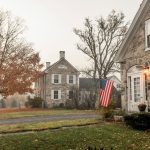The Up Side to Recession
Recently I brought some pants in to Jane’s in Stitches, a tiny nook of a place on a side street in Peterborough, New Hampshire. In her neat, cozy room, Jane sews and alters and repairs whatever it is people wear and want to keep wearing. A young man stood in front of me; he had […]
Recently I brought some pants in to Jane’s in Stitches, a tiny nook of a place on a side street in Peterborough, New Hampshire. In her neat, cozy room, Jane sews and alters and repairs whatever it is people wear and want to keep wearing. A young man stood in front of me; he had come to pick up a hooded sweatshirt that had needed a new zipper. “Thank you so much,” he said to Jane. “So much,” he added. It was obvious that this well-faded sweatshirt, emblazoned with the logo of a school whose name I couldn’t make out, meant the world to him. Now freshly zippered, it would hopefully last for years ahead.
I was there to have her shorten some jeans I’d bought on sale, for less than half what I’d paid for new jeans less than two years before. Those jeans had become so worn that they’d become the source of ribbing from friends who know how frugal I am when it comes to my own clothes. Now I plunked three pairs of pants on Jane’s table, where in the next few days she’d alter them to fit me perfectly and I’d be all set for the next few years.
With all the pundits yelling and writing at us about the financial woes we all face, sometimes you just need to step into a place like Jane’s in Stitches to get a reality check. Jane said that she’s seen a lot more people bringing in clothes for altering than before. She can hardly keep up. And while economists implore us to spend and spend, to buy stuff so that there’s more need to make more, and so on down the line, maybe we need to pause right here in Jane’s in Stitches and reflect a bit.
A few months ago, the noted environmentalist and author Bill McKibben gave a speech here in Peterborough. The Unitarian Church was packed with people eager to hear what he had to say about climate change and ways in which we can still have a chance as a planet to make it out of our own mess. What he had to say, in effect, was it’s reaching a critical time when everyone, and every nation, needs to rethink the wasteful, extravagant ways of living that have marked the past decades. I’ve been as guilty as anyone. When my children were young, I filled my car trunk at Christmastime with all sorts of plastic stuff, then filled it again. I liked seeing a living room crammed with pretty packages that they’d tear into within minutes. A few weeks later, a lot of those plastic things stood in corners of the playroom, already obsolete. On to new things.
So maybe we needed this bleak financial news to remind all of us that for generations before us, New Englanders made it do, wore it out, used it up, or did without. It wasn’t meanness; it was just a special sort of fiscal wisdom. People stitched things together, clothing and communities. Many years ago, I got to know Helen and Scott Nearing, pioneering homesteaders, whose writings and way of life attracted a legion of followers. Scott lived to the age of 100, and he never ever needed or used credit. Helen and Scott grew much of their food; they entertained themselves with friends, talk, and music. They made the shelters they lived in. They lived a full life without credit cards or shopping sprees. It was a low-stress, common-sense way to live.
Maybe the real stimulus package we all need is an infusion of common sense. If the long road to economic recovery leads, in part, to millions of people taking stock and asking whether this gadget or that gadget is better than playing games together again — if they ever did — or to whole communities rethinking transportation, or whole communities promoting buying local, then maybe one day we’ll look back on the stock market debacle of 2008 and say, It did make a difference.








Thanks for this insightful post. I have followed finance and economics closely since the mid-1980s, and until just recently the statement was always: “We learned the necessary lessons from the Great Depression. It will never be repeated again.” Now, facing a crisis acknowledged to be the biggest since the post-1929 period, we suddenly have debates over what will work, debates over what did and didn’t work in the 1930s. Seems like there isn’t a generally accepted understanding of why the Great Depression happened, after all.
In the mid-1970s, as a Colby College student, I attended a lecture by the Nearings. I was struck deeply then. And now, my wife and I hope that we can apply some of their principles of living on our 5-acre lot in rural Northeastern Connecticut, as a way of getting through whatever is coming. We’ve installed corn stoves, we grew a lot of our own food last year, we are trying (struggling) to pay down the college bills and debt.
Your post is an inspiration! Thanks!